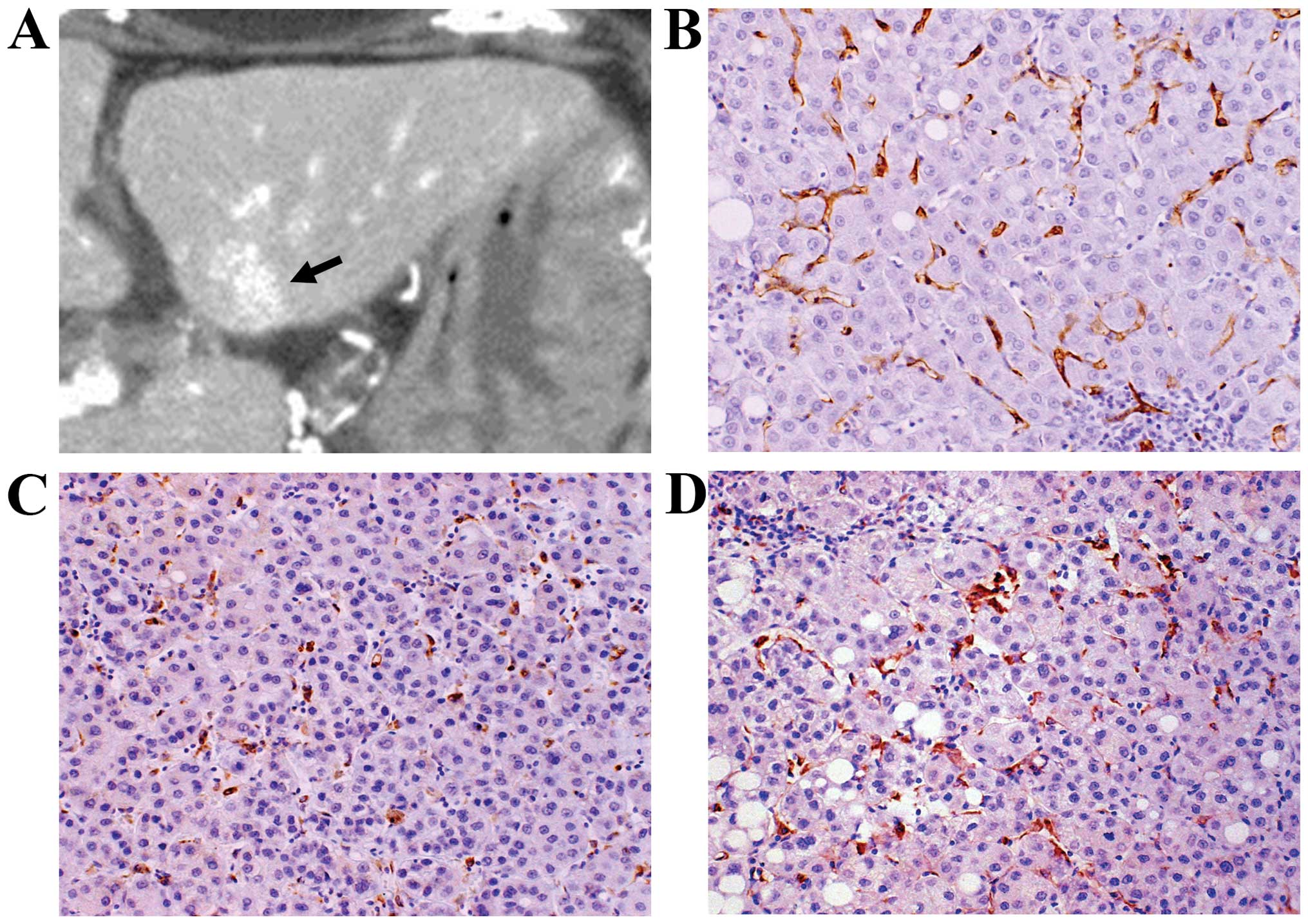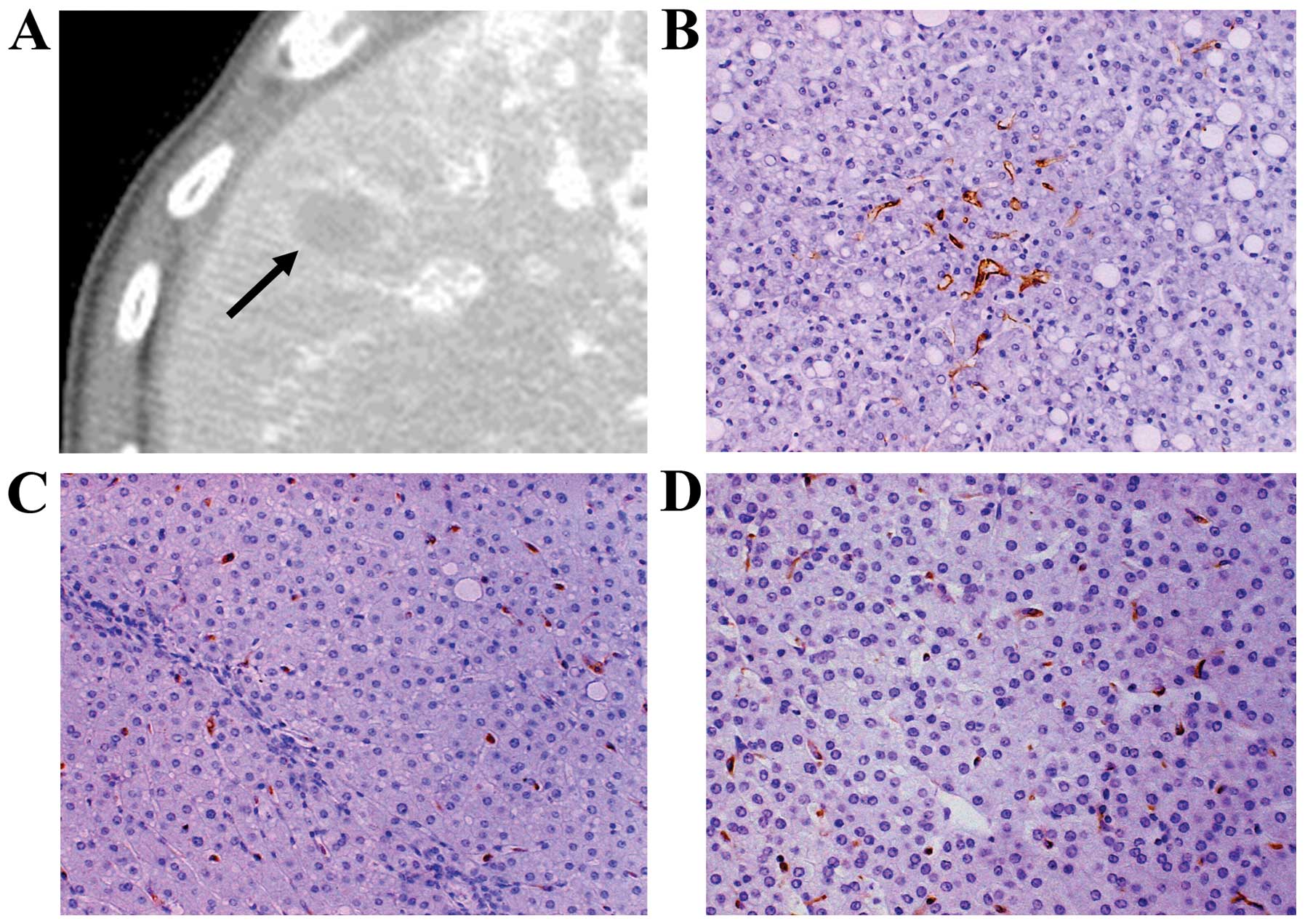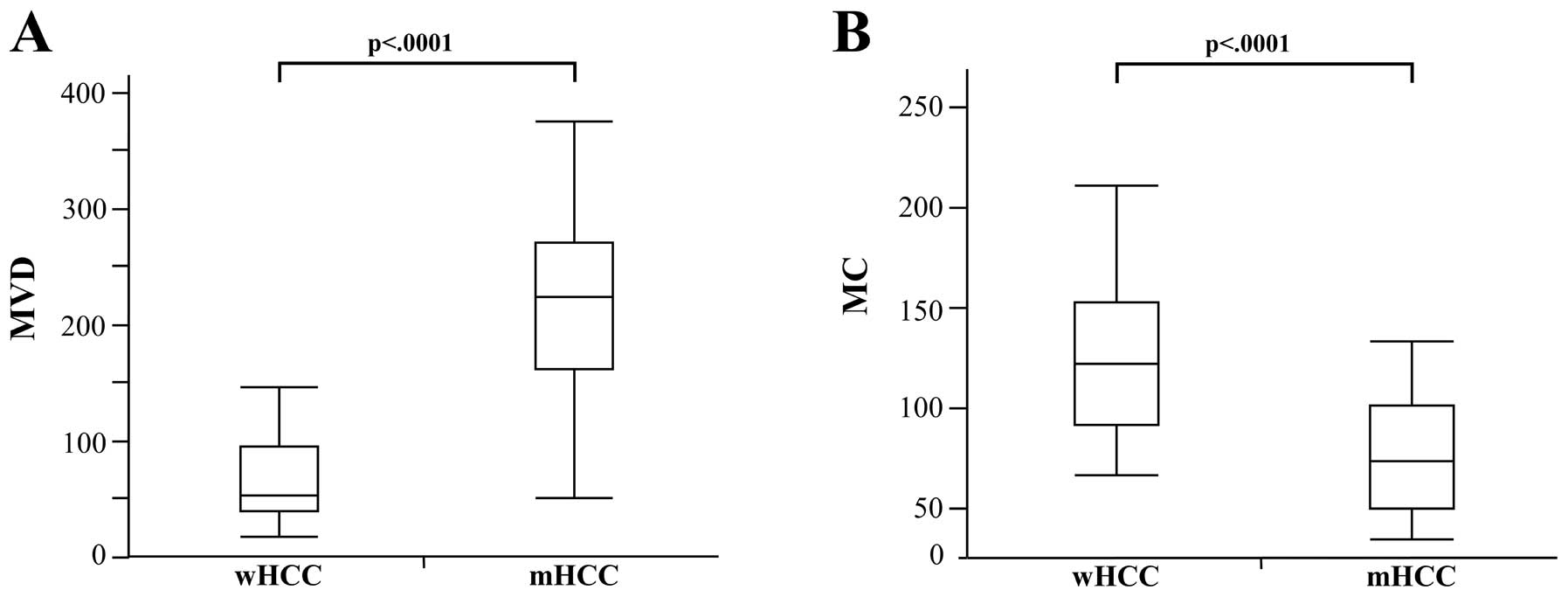|
1
|
Okuda K: Hepatocellular carcinoma:
clinicopathological aspects. J Gastroenterol Hepatol. 12:S314–S318.
1997. View Article : Google Scholar : PubMed/NCBI
|
|
2
|
Bosch FX, Ribes J, Díaz M and Cléries R:
Primary liver cancer: worldwide incidence and trends.
Gastroenterology. 127:S5–S16. 2004. View Article : Google Scholar : PubMed/NCBI
|
|
3
|
Llovet JM, Burroughs A and Bruix J:
Hepatocellular carcinoma. Lancet. 362:1907–1917. 2003. View Article : Google Scholar
|
|
4
|
Feitelson MA, Sun B, Satiroglu Tufan NL,
Liu J, Pan J and Lian Z: Genetic mechanisms of
hepatocarcinogenesis. Oncogene. 21:2593–2604. 2002. View Article : Google Scholar : PubMed/NCBI
|
|
5
|
Kudo M: Multistep human
hepatocarcinogenesis: correlation of imaging with pathology. J
Gastroenterol. 44(Suppl 19): 112–118. 2009. View Article : Google Scholar : PubMed/NCBI
|
|
6
|
Ueda K, Terada T, Nakanuma Y and Matsui O:
Vascular supply in adenomatous hyperplasia of the liver and
hepatocellular carcinoma: a morphometric study. Hum Pathol.
23:619–626. 1992. View Article : Google Scholar : PubMed/NCBI
|
|
7
|
Fujita N, Aishima S, Iguchi T, et al:
Down-regulation of artery in moderately differentiated
hepatocellular carcinoma related to tumor development. Hum Pathol.
41:838–847. 2010. View Article : Google Scholar : PubMed/NCBI
|
|
8
|
Tajima T, Honda H, Taguchi K, et al:
Sequential hemodynamic change in hepatocellular carcinoma and
dysplastic nodules: CT angiography and pathologic correlation. AJR
Am J Roentgenol. 178:885–897. 2002. View Article : Google Scholar : PubMed/NCBI
|
|
9
|
Hayashi M, Matsui O, Ueda K, et al:
Correlation between the blood supply and grade of malignancy of
hepatocellular nodules associated with liver cirrhosis: evaluation
by CT during intraarterial injection of contrast medium. AJR Am J
Roentgenol. 172:969–976. 1999. View Article : Google Scholar
|
|
10
|
Biswas SK and Mantovani A: Macrophage
plasticity and interaction with lymphocyte subsets: cancer as a
paradigm. Nat Immunol. 11:889–896. 2010. View Article : Google Scholar : PubMed/NCBI
|
|
11
|
Martinez FO, Gordon S, Locati M and
Mantovani A: Transcriptional profiling of the human
monocyte-to-macrophage differentiation and polarization: new
molecules and patterns of gene expression. J Immunol.
177:7303–7311. 2006. View Article : Google Scholar : PubMed/NCBI
|
|
12
|
Lewis CE and Pollard JW: Distinct role of
macrophages in different tumor microenvironments. Cancer Res.
66:605–612. 2006. View Article : Google Scholar : PubMed/NCBI
|
|
13
|
Shirabe K, Mano Y, Muto J, et al: Role of
tumor-associated macrophages in the progression of hepatocellular
carcinoma. Surg Today. 42:1–7. 2012. View Article : Google Scholar : PubMed/NCBI
|
|
14
|
Leek RD, Lewis CE, Whitehouse R, Greenall
M, Clarke J and Harris AL: Association of macrophage infiltration
with angiogenesis and prognosis in invasive breast carcinoma.
Cancer Res. 56:4625–4629. 1996.PubMed/NCBI
|
|
15
|
Koide N, Nishio A, Sato T, Sugiyama A and
Miyagawa S: Significance of macrophage chemoattractant protein-1
expression and macrophage infiltration in squamous cell carcinoma
of the esophagus. Am J Gastroenterol. 99:1667–1674. 2004.
View Article : Google Scholar : PubMed/NCBI
|
|
16
|
Hanada T, Nakagawa M, Emoto A, Nomura T,
Nasu N and Nomura Y: Prognostic value of tumor-associated
macrophage count in human bladder cancer. Int J Urol. 7:263–269.
2000. View Article : Google Scholar : PubMed/NCBI
|
|
17
|
Lissbrant IF, Stattin P, Wikstrom P,
Damber JE, Egevad L and Bergh A: Tumor associated macrophages in
human prostate cancer: Relation to clinicopathological variables
and survival. Int J Oncol. 17:445–451. 2000.PubMed/NCBI
|
|
18
|
Imai Y, Murakami T, Yoshida S, et al:
Superparamagnetic iron oxide-enhanced magnetic resonance images of
hepatocellular carcinoma: correlation with histological grading.
Hepatology. 32:205–212. 2000. View Article : Google Scholar : PubMed/NCBI
|
|
19
|
Theise ND, Ishak KG, Kojiro M, et al:
Hepatocellular carinoma. World Health Organization Classification
of the Digestive System. Bosman FT, Carneiro F, Hruban RH and
Theise ND: IARC Press; Lyon: pp. 205–216. 2010
|
|
20
|
International Consensus Group for
Hepatocellular Neoplasia. Pathologic diagnosis of early
hepatocellular carcinoma: a report of theInternational Consensus
Group for Hepatocellular Neoplasia. Hepatology. 49:658–664. 2009.
View Article : Google Scholar : PubMed/NCBI
|
|
21
|
Weidner N, Semple JP, Welch WR and Folkman
J: Tumor angiogenesis and metastasis - correlation in invasive
breast carcinoma. N Engl J Med. 324:1–8. 1991. View Article : Google Scholar : PubMed/NCBI
|
|
22
|
Hasita H, Komohara Y, Okabe H, et al:
Significance of alternatively activated macrophages in patients
with intrahepatic cholangiocarcinoma. Cancer Sci. 101:1913–1919.
2010. View Article : Google Scholar : PubMed/NCBI
|
|
23
|
Fujiwara Y, Komohara Y, Ikeda T and Takeya
M: Corosolic acid inhibits glioblastoma cell proliferation by
suppressing the activation of signal transducer and activator of
transcription-3 and nuclear factor-kappa B in tumor cells and
tumor-associated macrophages. Cancer Sci. 102:206–211. 2011.
View Article : Google Scholar
|
|
24
|
Komohara Y, Ohnishi K, Kuratsu J and
Takeya M: Possible involvement of the M2 anti-inflammatory
macrophage phenotype in growth of human gliomas. J Pathol.
216:15–24. 2008. View Article : Google Scholar : PubMed/NCBI
|
|
25
|
Yancopoulos GD, Davis S, Gale NW, Rudge
JS, Wiegand SJ and Holash J: Vascular-specific growth factors and
blood vessel formation. Nature. 407:242–248. 2000. View Article : Google Scholar : PubMed/NCBI
|
|
26
|
Holash J, Wiegand SJ and Yancopoulos GD:
New model of tumor angiogenesis: dynamic balance between vessel
regression and growth mediated by angiopoietins and VEGF. Oncogene.
18:5356–5362. 1999. View Article : Google Scholar : PubMed/NCBI
|
|
27
|
El-Assal ON, Yamanoi A, Soda Y, et al:
Clinical significance of microvessel density and vascular
endothelial growth factor expression in hepatocellular carcinoma
and surrounding liver: possible involvement of vascular endothelial
growth factor in the angiogenesis of cirrhotic liver. Hepatology.
27:1554–1562. 1998. View Article : Google Scholar
|
|
28
|
Wada H, Nagano H, Yamamoto H, et al:
Expression pattern of angiogenic factors and prognosis after
hepatic resection in hepatocellular carcinoma: importance of
angiopoietin-2 and hypoxia-induced factor-1α. Liver Int.
26:414–423. 2006.PubMed/NCBI
|
|
29
|
Mitsuhashi N, Shimizu H, Ohtsuka M, et al:
Angiopoietins and Tie-2 expression in angiogenesis and
proliferation of human hepatocellular carcinoma. Hepatology.
37:1105–1113. 2003. View Article : Google Scholar : PubMed/NCBI
|
|
30
|
de Visser KE, Eichten A and Coussens LM:
Paradoxical roles of the immune system during cancer development.
Nat Rev Cancer. 6:24–37. 2006.
|
|
31
|
Mantovani A, Sozzani S, Locati M, Allavena
P and Sica A: Macrophage polarization: tumor-associated macrophages
as a paradigm for polarized M2 mononuclear phagocytes. Trends
Immunol. 23:549–555. 2002. View Article : Google Scholar : PubMed/NCBI
|
|
32
|
Murdoch C, Giannoudis A and Lewis CE:
Mechanisms regulating the recruitment of macrophages into hypoxic
areas of tumors and other ischemic tissues. Blood. 104:2224–2234.
2004. View Article : Google Scholar : PubMed/NCBI
|
|
33
|
Kanematsu M, Osada S, Amaoka N, et al:
Expression of vascular endothelial growth factor in hepatocellular
carcinoma and the surrounding liver: correlation with
angiographically assisted CT. AJR Am J Roentgenol. 183:1585–1593.
2004. View Article : Google Scholar : PubMed/NCBI
|
|
34
|
Kanematsu M, Osada S, Amaoka N, et al:
Expression of vascular endothelial growth factor in hepatocellular
carcinoma and the surrounding liver and correlation with MRI
findings. AJR Am J Roentgenol. 184:832–841. 2005. View Article : Google Scholar : PubMed/NCBI
|
|
35
|
Zhang W, Zhu XD, Sun HC, et al: Depletion
of tumor-associated macrophages enhances the effect of sorafenib in
metastatic liver cancer models by antimetastatic and antiangiogenic
effects. Clin Cancer Res. 16:3420–3430. 2010. View Article : Google Scholar : PubMed/NCBI
|




















